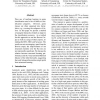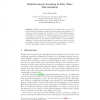246 search results - page 7 / 50 » Learning a Fine Vocabulary |
114
click to vote
AAAI
2011
13 years 11 months ago
2011
Coarse-to-fine approaches use sequences of increasingly fine approximations to control the complexity of inference and learning. These techniques are often used in NLP and visio...
ACL
2010
14 years 9 months ago
2010
Prior use of machine learning in genre classification used a list of labels as classification categories. However, genre classes are often organised into hierarchies, e.g., coveri...
101
click to vote
ICANNGA
2007
Springer
15 years 5 months ago
2007
Springer
Reinforcement Learning (RL) is analyzed here as a tool for control system optimization. State and action spaces are assumed to be continuous. Time is assumed to be discrete, yet th...
84
Voted
IJCNN
2000
IEEE
15 years 3 months ago
2000
IEEE
: A system for learning the pre-grasp positioning task for a robot manipulator is presented. The images delivered from a gripper mounted camera are analysed using Gabor filters wh...
111
click to vote
PCM
2009
Springer
15 years 5 months ago
2009
Springer
Recently, the bag-of-words (BOW) based image representation is getting popular in object categorization. However, there is no available visual vocabulary and it has to be learned. ...


